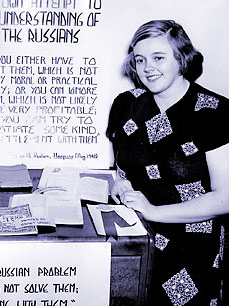 Book
collecting is not a sport for the young —at least, that’s the
impression you get if you survey the crowd at most book fairs, where the
typical customer is much closer to retirement age than the legal drinking
age. There’s a reason for this: building a collection takes time,
wisdom, and plenty of capital.
Book
collecting is not a sport for the young —at least, that’s the
impression you get if you survey the crowd at most book fairs, where the
typical customer is much closer to retirement age than the legal drinking
age. There’s a reason for this: building a collection takes time,
wisdom, and plenty of capital. Collegiate Book-Collecting Championship
Who’s the Best of the Next Generation?
 Book
collecting is not a sport for the young —at least, that’s the
impression you get if you survey the crowd at most book fairs, where the
typical customer is much closer to retirement age than the legal drinking
age. There’s a reason for this: building a collection takes time,
wisdom, and plenty of capital.
Book
collecting is not a sport for the young —at least, that’s the
impression you get if you survey the crowd at most book fairs, where the
typical customer is much closer to retirement age than the legal drinking
age. There’s a reason for this: building a collection takes time,
wisdom, and plenty of capital. But it doesn’t always work that way. Consider
Matthew Bruccoli (see Gently Mad, FB&C #15). He made a good
start on his F. Scott Fitzgerald collection while still in college. Or Jay
Miller, whose aviation history collection forms the core of the Aerospace
Education Center library in Little Rock, Arkansas.
Miller began collecting at age nine, and by the
time he graduated from college and became the curator of the University
of Texas at Austin’s aviation archive, his personal collection was
nearly as large as the university’s.
Both of these collectors, as well as more than
two dozen others each year, won collegiate book-collecting contests. At Fine
Books & Collections, we want to encourage the next generation of
collectors and the libraries that are mentoring them. We are very excited,
therefore, to announce the Fine Books & Collections’s
Collegiate Book-Collecting Championship, with a top prize of $2,500. Anyone
who wins a collegiate contest this academic year will automatically be eligible
to compete in the championship. In 2007, we will expand the contest to include
entries from students at colleges that do not hold a contest.
College libraries have a longstanding tradition
of identifying and mentoring student collectors. Book-collecting contests
date back to the late 1920s, when W. W. Thayer gave a $50 prize to the student
at Swarthmore College with the best personal library. A few years later,
A. Edward Newton endowed the Swarthmore contest and promoted the idea in
his rare-book column in The Atlantic Monthly (see Public Domain, FB&C #17).
That was October 1931, and by 1935, about twenty colleges were hosting contests.
Several of these, including UCLA, UC Berkeley, and Sweet Briar, are still
holding contests, although only Swarthmore’s has been offered continuously.
More than thirty colleges will offer prizes during the 2005– 2006
school year, in amounts ranging from $100 at Bryn Mawr to the $2,000 Philip
Hofer Prize at Harvard. A complete list of the 2005 winners begins here.
Peter Berg, the assistant director of special collections
at Michigan State University, said that the library’s contest is an
attempt to point students toward the stacks. “There is such an emphasis
on electronic resources that there were people in the library who wanted
to encourage the use of books and the value of books,” he said. “Despite
all the wonderful advances in electronic resources, the library still spends
a lot of money on books, and they are still very valuable.” Joe Malloy,
the librarian who runs the newly revived contest at Sweet Briar, offered
a similar view: “It gives the library another way to work with students
who love books.”
These contests have given many high-profile collectors,
dealers, and librarians their start. Peter Hanff, the deputy director of
UC Berkeley’s special collections library, the Bancroft, won the Corle
prize at UC Santa Barbara as an undergraduate. His winning collection of
L. Frank Baum’s Oz books became the basis of the standard Oz bibliography,
which he co-authored. “Winning the prize was transformative,” he
said, “and it pushed me in the direction I have pursued ever since.
It really confirmed that I could go about my life following my book interests.”
Like all of the contests at individual schools,
the FB&C competition will not be judged on the monetary value or rarity
of the book entered. The observation Nicholas Basbanes made about book collecting
in Among the Gently Mad applies to our contest as well:
To excel in this
endeavor, you have to be willing to bring something to the table, and by
that I do not mean a stack of chips to underwrite your action as a player,
I mean your imagination, your intelligence, your eagerness to explore and
learn, your willingness to improvise and to innovate in areas others might
consider a waste of precious time.
The principle criteria for judging will be the intelligence
and originality of the collection and the evidence that the books were sought
out and not simply accumulated. The application will be simple—a short
introductory essay and a brief annotated bibliography of the student’s
best books. Visit our web site, www.finebooksmagazine.com,
for rules and other information.


